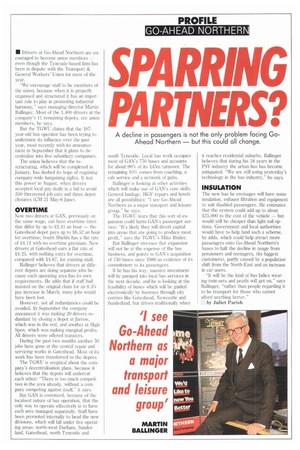SPARRING
Page 44

If you've noticed an error in this article please click here to report it so we can fix it.
TNERS?
A decline in passengers is not the only problem facing GoAhead Northern — but this could all change.
• Drivers at Go-Ahead Northern are encouraged to become union members --even though the Tyneside-based firm has been in dispute with the Transport Si. General Workers' Union for most of the year.
"We encourage staff to be members of the union, because when it is properly organised and structured it has an important role to play in promoting industrial harmony," says managing director Martin Ballinger. Most of the 1,400 drivers at the company's 11 remaining depots, are union members, he says.
But the TGWU claims that the 107year-old bus operator has been trying to undermine its influence over the past year, most recently with its announcement in September that it plans to decentralise into five subsidiary companies.
The union believes that the restructuring, which will he completed in January, has dashed its hope of regaining company-wide bargaining rights. It lost this power in August, when drivers accepted local pay deals in a bid to avoid 350 threatened job cuts and three depot closures (CM 31 May-6 June).
OVERTIME
Now two drivers at GAN, previously on the same wage, can have overtime rates that differ by up to £2.41 an hour — the Gateshead depot pays up to £6.52 an hour for overtime: South Shields has a flat rate of £4.11 with no overtime premium. New drivers at Gateshead earn a flat rate of 4.25. with nothing extra for overtime, compared with £4.67, for existing staff.
Ballinger believes that drivers at different depots are doing separate jobs because each operating area has its own requirements. lie adds that if staff had insisted on the original claim for an 8.3% pay increase in March, many jobs would have been lost.
However, not all redundancies could be avoided. In September the company announced it was making 20 drivers redundant by closing a depot at Jarrow, which was in the red, and another at High Spen, which was making marginal profits. All drivers were offered transfers.
During the past two months another 50 jobs have gone at the central repair and servicing works in Gateshead. Most of its work has been transferred to the depots.
The TGWU is sceptical about the company's decentralisation plans, because it believes that the depots will undercut each other: "There is too much competition in the area already, without a company competing against itself," it says.
But GAN is convinced, because of the localised nature of bus operation, that the only way to operate effectively is to have each area managed separately. Staff have been promoted internally to head the new divisions, which will fall under five operating areas: north-west Durham, Sunderland, Gateshead, north Tyneside and south Tyneside. Local bus work occupies most of GAN's 750 buses and accounts for about 90% of its £45m turnover. The remaining 107r comes from coaching, a cab service and a network of pubs.
Ballinger is looking at other activities which will make use of GAN's core skills. General haulage, HGV repairs and hotels are all possibilities: "I see Go-Ahead Northern as a major transport and leisure group," he says.
The TGWU fears that this sort of expansion could harm GAN's passenger service: "It's likely they will divert capital into areas that are going to produce most profit," says the TGWU's Mike Brider.
But Ballinger stresses that expansion will not be at the expense of the bus business, and points to GAN's acquisition of 130 buses since 1986 as evidence of its commitment to its passengers.
If he has his way, massive investment will be pumped into local bus services in the next decade, and he is looking at the feasibility of buses which will be guided electronically by busways through city centres like Gateshead, Newcastle and Sunderland, but driven traditionally when it reaches residential suburbs. Ballinger believes that during his 18 years in the PSV industry the urban bus has become antiquated. "We are still using yesterday's technology in the bus industry," he says.
INSULATION
The new bus he envisages will have noise insulation, exhaust filtration and equipment to suit disabled passengers. He estimates that the system could add up to about £25,000 to the cost of the vehicle — but would still be cheaper than light rail options. Government and local authorities would have to help fund such a scheme, he adds, which could help attract more passengers onto Go-Ahead Northern's buses to halt the decline in usage from pensioners and teenagers, (its biggest customers), partly caused by a population shift from the North-East and an increase in car users.
• "It will be the kind of bus ladies wearing twin-sets and pearls will get on," says Ballinger, "rather than people regarding it to be transport for those who cannot afford anything better."
El by Juliet Parish












































































































